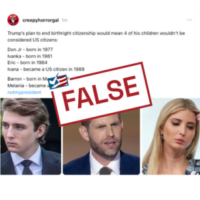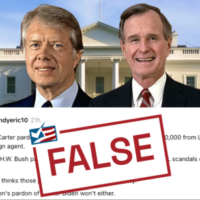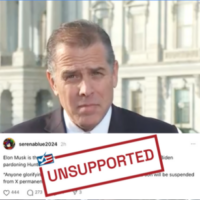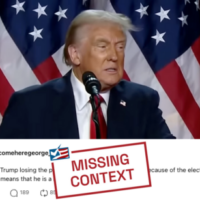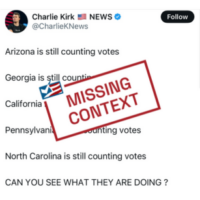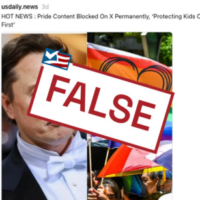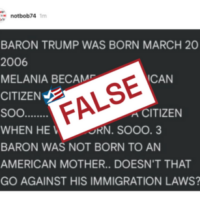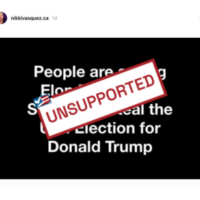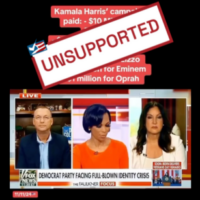President-elect Donald Trump has renewed his call to end birthright citizenship for children born in the U.S. whose parents are not in the country legally. Online posts falsely claim this would strip four of Trump’s children of citizenship because of their mothers’ citizenship status when they were born.
Debunking Viral Claims
FactCheck.org is one of several organizations working with Facebook to debunk misinformation shared on the social media network. We provide several resources for readers: a guide on how to flag suspicious stories on Facebook and a list of websites that have carried false or satirical articles, as well as a video and story on how to spot false stories.
Bush, Carter Didn’t Pardon Relatives, Contrary to Posts
President Joe Biden is one of only a few presidents who have granted pardons to a relative. But social media posts falsely claim that former Presidents Jimmy Carter and George H.W. Bush also pardoned family members. While Billy Carter and Neil Bush faced controversies, neither was criminally charged nor received a pardon.
No Evidence Musk Threatened to Ban X Users Celebrating Hunter Biden’s Pardon
Elon Musk trolled President Joe Biden on X after Hunter Biden’s pardon, sharing a community note mocking the president’s previous post that said, “No one is above the law.” Soon after, a Threads post falsely claimed Musk threatened “anyone glorifying” the pardon “will be suspended from X permanently.” There’s no evidence Musk made such a statement.
Trump Won the Popular Vote, Contrary to Claims Online
President-elect Donald Trump is the first Republican presidential candidate to win the popular vote in 20 years. Social media users have wrongly claimed that Trump lost the popular vote, but they are confusing the popular vote with a majority of votes. The unofficial results show Trump received slightly less than a majority, but more votes than any candidate.
Viral Claim Falsely Suggests Trump Ended Violence in Gaza
Attacks by Israeli forces and Hamas continue to kill or displace people in the Gaza Strip. But social media posts misleadingly claim Donald Trump’s victory in the presidential election led Hamas to call for an end to the war in Gaza. Hamas has called for a ceasefire several times before the election. And the violence has continued since Election Day.
Post Misleadingly Questions Unfinished Ballot Counting in Some States
Elon Musk Has Not Blocked Pride-Related Content from X, Contrary to Posts
X owner Elon Musk has rolled back policies intended to protect transgender people from harassment on his platform. But social media posts falsely claimed Pride-related content has now been “blocked on X permanently,” citing a purported “late-night announcement” by Musk. The claim originated on a satirical website.
Posts Falsely Question Barron Trump’s Citizenship Status
President-elect Donald Trump has called for an interpretation of the 14th Amendment that would deny citizenship to children born in the U.S. to parents in the country illegally. That has prompted some on social media to wrongly speculate that under such a policy, Trump’s son Barron might not be a U.S. citizen because his mother wasn’t a citizen when he was born in New York.
Musk’s Starlink Was Not Connected to Vote Tabulation, Contrary to Online Claims
Elon Musk’s Starlink system helped provide internet access to communities affected by the recent hurricanes. But online posts spread baseless claims that Starlink “uploaded votes in swing states” and helped Donald Trump win the election. Experts said voting machines are not connected to the internet during tabulation; one state election official called the claims “utter garbage.”
No Evidence Harris Campaign Paid for Celebrity Endorsements
Vice President Kamala Harris received many celebrity endorsements leading up to the election, including from Beyoncé, Oprah Winfrey, Eminem, Megan Thee Stallion and Lizzo. Social media posts have made the unfounded claim that these celebrities were collectively paid $20 million for their endorsements. We’ve found no evidence to support the claim.
